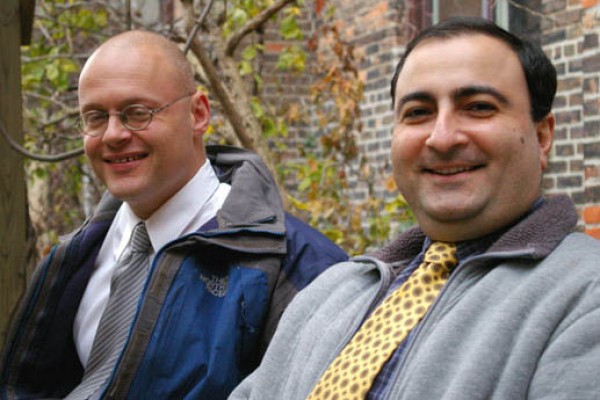 Professors Robert Weaver (l.) and Nazim Habibov (r.) have established a definitive cause and effect that proves that strong societal connections lead to better health.
Professors Robert Weaver (l.) and Nazim Habibov (r.) have established a definitive cause and effect that proves that strong societal connections lead to better health.
There is power in a tight-knit community, say two UWindsor researchers whose work has linked strong social connections to better health.
Social work professor Nazim Habibov used results from Statistic Canada’s 2011 General Social Survey to determine how social capital—the social networks people have established for themselves—influenced their health.
“Up until now we knew the two were linked, but it was difficult to determine if high social capital encouraged good health, or if good health improved social capital,” says Dr. Habibov. “My colleague and co-author Dr. Robert Weaver and I have now established a definitive cause and effect that proves it is strong societal connections that lead to better health.”
The researchers looked at three aspects of social capital—whether the Canadians surveyed had voted in the last election, had close friends and family members, and were involved in community associations.
“By voting, they are voicing their desire to allocate more money to health and social services, or at least make that allocation more equitable, and as a result they raise their health status. You take care of yourself through social policy” says Habibov.
He says the research indicated that people who make the effort to join school, neighbourhood and community associations tend to rate themselves as having good health.
“By interacting with people you are increasing both your self-esteem and your feelings of security,” Habibov says.
“When you communicate with others you can exchange information about healthy foods and recipes, and you can learn about recreational opportunities. The simple act of participating also means you are not at home, glued to the television.”
Finally, the survey asked people if they felt they were surrounded by close friends and relatives. Habibov says these are the people you know you can rely on, and who know they can rely on you.
“These relationships reduce your stress as well as any feelings of isolation,” he says. “Close friends and relatives can explain how the health care system works, they can make you aware of medical services or recommend a good doctor. They can even drive you to and from medical appointments.”
The researcher says these findings are important because they expand perceptions of what it takes to improve a person’s health status.
“I think it’s interesting for people to consider that good health status is not all about spending money on formal health care like doctors, medications and medical equipment.”
Habibov says this research would not be possible without the high-quality statistics collected by Statistics Canada.
“These results reflect Canadians from all parts of the country and the sample size is larger and more diverse than what is usually available to researchers. You can’t ignore these results or dismiss them as being specific to one region.”
Habibov and Weaver’s findings appear in the December 2014 issue of Sociology Health Review, in the article, Endogenous Social Capital and Self-Rated Health: Results from Canada’s General Social Survey.
